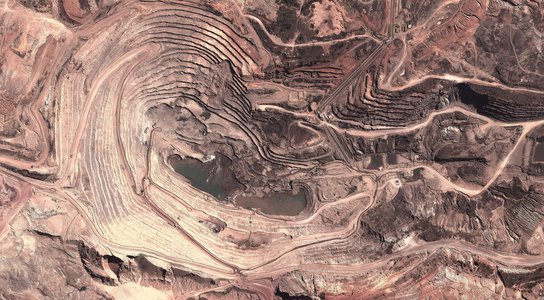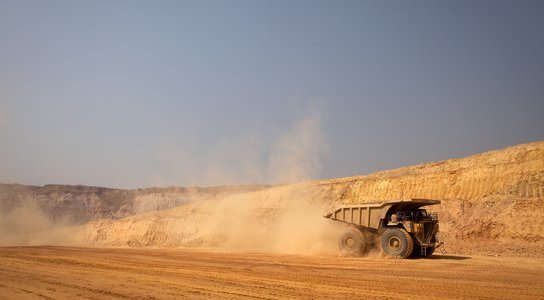Between 2013 and 2016 mining giant Glencore paid over $75m to Dan Gertler, a controversial businessman accused of bribing senior officials in Democratic Republic of Congo to advance his mining interests, Global Witness revealed today. These payments were due to be paid to Congo’s state mining company Gécamines under the terms of the original contract it had with Glencore.
Glencore did not disclose in company filings that it was instead making these payments to Gertler, a known corruption risk. That he was the recipient of the payments comes to light only weeks after Glencore bought Gertler out of mining assets it held jointly with him in Congo in a billion dollar deal.
A Global Witness investigation found that from 2013 to 2016 Toronto-listed Katanga Mining, majority-owned by Glencore, made “signature bonus” and other payments totalling over $75 million to Dan Gertler’s Africa Horizons company, registered in the Cayman Islands. Under the original contract these payments would have gone to Gécamines, but Global Witness wrote to Glencore after reviewing company documents and filings that raised questions over the true recipient of the payments. Glencore admitted that they were made to Gertler’s company.
“It’s outrageous that Glencore has been making payments to a friend of the Congolese President who has been accused of bribery and corruption, and then not telling its shareholders or the public that it’s done so,” said Pete Jones from the Congo team at Global Witness. “Glencore has been in business in Congo with Gertler for a decade and has known about the allegations that have been made against him for years.”
Gertler is a close friend of Congo’s President Joseph Kabila and has been a focus of major foreign bribery investigations in the US and UK. In a finding by US authorities in September against the hedge fund Och-Ziff, an “infamous Israeli businessman” was identified as having paid bribes to Congolese officials to win mining licences for Och-Ziff. The businessman is widely understood to be Gertler. He is reported to be a central focus of a corruption investigation by the UK’s Serious Fraud Office into Kazakh mining company ENRC, based in part on ENRC’s deals with Gertler in Congo. Gertler’s spokesman told Bloomberg that his company “vigorously contests any and all accusations of wrongdoing in any of its dealings in [Congo]”.
Congo has vast natural resource wealth, but corruption, mismanagement and the sale of mines below market value have helped keep it one of the world’s poorest countries, consistently languishing near the bottom of the UN Human Development Index.
Glencore’s Katanga Mining’s company filings to the Toronto Stock Exchange for 2013 indicated that royalty and signature bonus payments were “payable to Gécamines”. In subsequent filings, the words “payable to Gécamines” were omitted and no new recipient was named. Glencore declared the 2013 and 2014 payments it had made to Gertler’s company as payments to Gécamines, in its submissions to the Extractive Industries Transparency Initiative (EITI).Glencore has now admitted, in a letter to Global Witness, that these payments actually went to Gertler from 2013 to 2016.
“The discrepancy between Katanga Mining’s filings and the real recipient of these huge payments runs the risk of misleading investors. Gertler is a well-known corruption risk in Congo’s mining sector and Gécamines is famously opaque. Investors need to ask Glencore why it felt comfortable making these payments and why it didn’t clearly disclose Gertler as the recipient,” said Jones.
Global Witness previously reported in November 2016 that since 2014 Glencore had made royalty payments, originally due to go to Congo’s state mining company, Gécamines, to Gertler’s Africa Horizons company instead. Glencore has now confirmed that it has in fact been making those royalties payments since 2013, as well as making signature bonus payments to Gertler instead of Gécamines for the same period. Glencore and Gertler’s representatives said in November that Gécamines had sold the rights to these royalties to Africa Horizons but they have not provided any details on the terms of the deal, nor have they said if the signature bonuses were part of this transaction.
In February 2017 Glencore announced that it had bought Gertler out of the two mining assets they joint-owned in Congo, the copper mine owned by Katanga Mining and the Mutanda mine. Despite buying Gertler out of these assets Glencore will continue to make royalty payments to Gertler on both projects, according to Glencore.
The redirection of royalty and signature bonus payments from Gécamines to Gertler was identifiable in large part thanks to the data in the 2014 Congo report by the EITI, which publishes mining, oil and gas company payments to states and state-owned companies. It is vital that such disclosure mechanisms become and remain law. It is extremely disappointing that the Trump administration has chosen to overturn payment reporting rules for US companies within its first month in the White House.
The broader importance of a system that legally requires company payment disclosures was underlined by an experienced equities analyst speaking to Global Witness: “Companies do not issue press releases when they get involved in underhand activities. Rather, such conduct is often slowly exposed through incremental information contained in public disclosures.”
Glencore has long been aware of the corruption risks related to its partnership with Gertler. Global Witness published a memo to Glencore and its shareholders as early as 2012 – before any of the signature bonus or royalty payments revealed here were made – to outline the “risks of corruption” associated with Gertler, after Glencore had struck opaque mining deals with him.
Glencore said it had “complied with its disclosure obligations” under Canadian securities law and the rules governing the Toronto Stock Exchange. It said it had declared the payments to Gertler’s company as payments to Gecamines in its EITI submission “because the payments discharged KCC’s [Kamoto Copper Company - the mining project in Congo] obligations to make these payments to Gecamines”. In response to questions from Global Witness in November, Glencore said that it was satisfied that there was an underlying basis for the assignment of royalty rights from Gecamines to Gertler.
Fleurette’s spokesperson at Powerscourt public relations firm did not provide a comment by the deadline, despite being granted an extension of time to respond. In the past Fleurette has denied any wrongdoing in its Congo deals. In November Fleurette said that what it had received was “far less than the amount … paid for the royalties” and that it “will have suffered a huge loss as a result”.
None of the parties involved has revealed what, if anything, Fleurette paid for the Gecamines royalties stream in KCC. Global Witness calls on Fleurette and Glencore to reveal the underlying basis for the royalties assignment, and for the regulators of the Toronto Stock Exchange to scrutinise the transactions and disclosures in light of securities law and stock exchange rules.
/ ENDS
Notes to editor:
- Table of payments from Glencore to Gertler’s Africa Horizons Investment Limited

Glencore told Global Witness that Gécamines’ royalty and signature bonus payments for 2013-2016 from the KCC mine, detailed above, had all been paid to Dan Gertler’s Africa Horizons Investment Limited. Company documents for KCC show that royalty payments in 2013 and 2014 were $17,049,443 and $24,876,874 respectively. It is as yet unclear what the royalty payments in 2015 were, and the mine temporarily suspended operations in September 2015 (which would normally mean no royalty payments for 2016). KCC was contractually obliged to pay Gécamines $15m of signature bonus instalments in 2013, 2014 and 2015, then a final instalment of $15.5m in 2016. KCC advanced the 2016 payment and paid it in 2015, according to Katanga Mining filings. Global Witness showed last year that KCC royalty payments in 2014 were redirected to Africa Horizons, so we did not include 2014 royalties in calculations to find the total of newly-revealed payments to Gertler. Global Witness calculated that these newly-revealed payments came to over $75m, which is the sum of 2013 royalties ($17m) plus the four signature bonus instalments ($60.5m). Katanga Mining’s company documents describe royalty prepayments in 2015, however it is unclear precisely how much was paid in royalties to Africa Horizons over the course of the year. More detailed disclosure from Katanga Mining is required to be able to come to an accurate estimate of the total sums redirected to Gertler’s company as royalty and signature bonus payments. - In November 2016 Global Witness revealed that Gertler’s Africa Horizons company had been receiving royalty payments due under the original contract to Gécamines.
- Global Witness’s 2014 report Glencore and the Gatekeeper outlines in more detail how Glencore and Dan Gertler worked together to establish their mining interests in Congo. The report shows how Glencore enriched Gertler by tens of millions of dollars and protected his interests as it gained control of the KCC project.
- In its 2013 report, Kofi Annan’s Africa Progress Panel described how just five Congolese mining deals involving offshore companies belonging to Dan Gertler saw Congo lose out on at least $1.36bn of potential revenues – the equivalent of twice the combined health and education spending.
- Global Witness also wrote to Glencore to ask about its decision to twice waive its contractual right to withhold payments of royalties from KCC, which it did only once the royalty revenue stream had been assigned to Gertler. As part of a 2008 deal with Gécamines, Glencore’s KCC mine had the right to withhold royalty payments to Gécamines starting 1 July 2015 as compensation for mining deposits KCC handed over to Gécamines in 2008, in the event that Gécamines had not adequately reimbursed Glencore. However rather than begin claiming those royalties, in the fourth quarter of 2014 (once the royalty payments were now being redirected to Gertler’s company) Glencore waived its rights to the money and extended the deadline for compensation to 1 July 2017. Then in the first quarter of 2015, it extended the deadline again, to March 2019. When asked why it waived its rights to these royalty payments, Glencore told Global Witness that Gécamines had requested an extension to the deadline and Glencore had complied.
- Glencore’s response to Global Witness is available here.
You might also like
-
Report Glencore and the Gatekeeper
Glencore, the world’s largest commodities trader, enriched a friend of the Democratic Republic of Congo’s president by tens of millions of dollars and protected his interests as it gained control of one of Africa’s biggest copper miners.
-
Press release Congo signs over potential $880m of royalties in Glencore project to offshore company belonging to friend of Congolese President
DRC’s state mining company signed over a potential $880m in royalties from Glencore project to an offshore company owned by the president’s friend, Dan Gertler.
-
Report Out of Africa
British tax havens and Congo's missing $1.5 billion